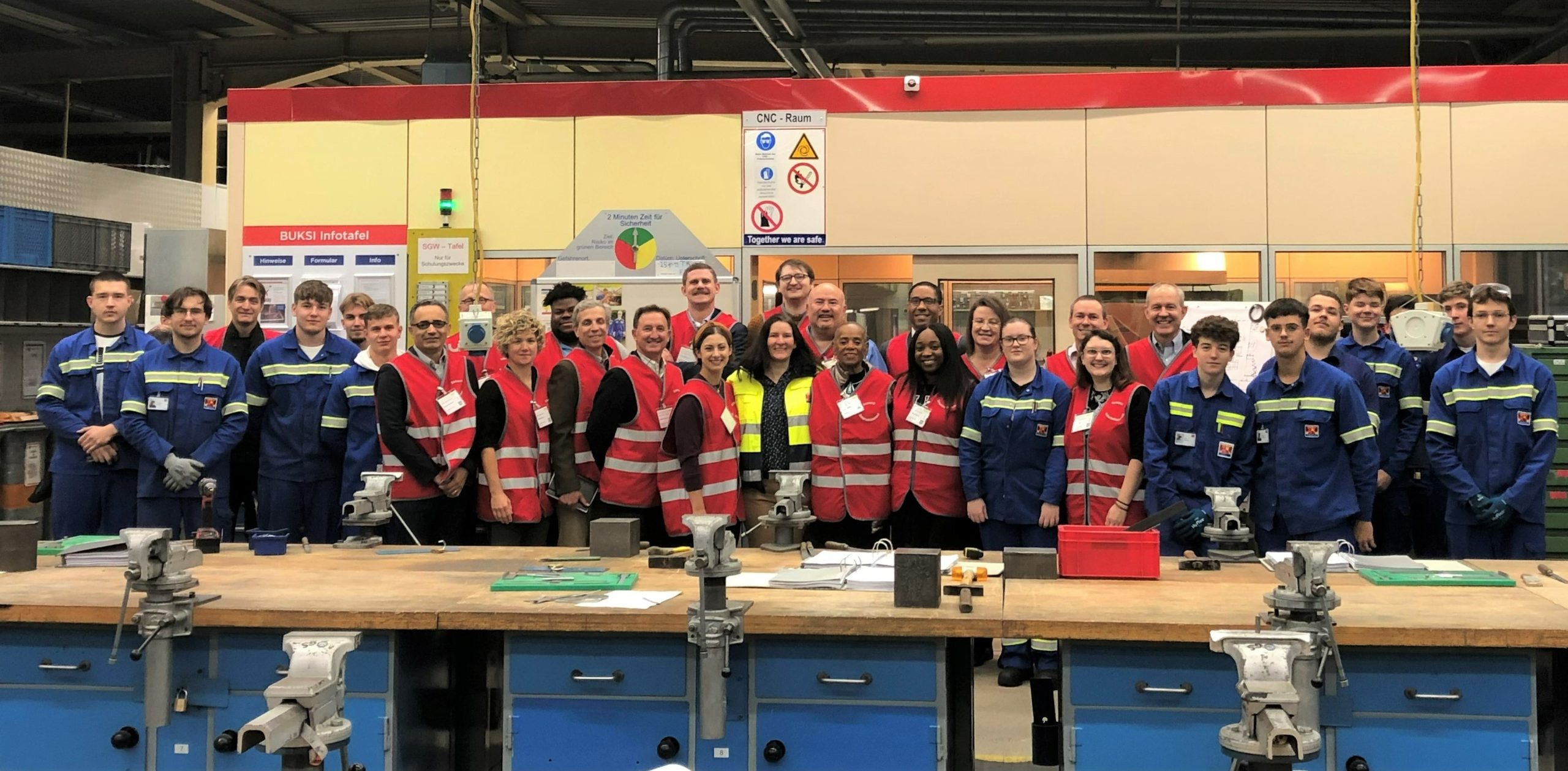
Photo: Courtesy of Novelis
From October 23 to October 29, 2022, a 17-person delegation of Americans visited Bonn, Koblenz, and Mainz as part of America Works/MAGNET: The Manufacturing Advocacy and Growth Network’s series of Stronger Together Manufacturing Workforce Missions to learn about Germany’s apprenticeship and workforce development system. The participants were from 10 states and represented eight different MEP centers from around the country; they also represented the federal government, manufacturing defense communities, workforce investment boards, and more.
Beginning in Bonn, the delegation met with the Federal Institute for Vocational Education and Training for an overview of the German dual system of apprenticeship training with approximately 325 standardized training occupations. The Institute conducts research on vocational education and training, stimulates innovation in the vocational system and develops new, practice-oriented solutions, and serves in an advisory capacity to all the stakeholders engaged in the apprenticeship system. The group then visited Brück Maschinenbau, a typical German Mittelstand company founded in 1906 that is the leading manufacturer of perforating presses. Meeting with the owner, the apprenticeship trainer, and apprentices, members of the delegation had the opportunity to learn about everyone’s motivation in doing apprenticeship programs which mainly came down to guaranteed skilled workers with the potential for secure, life-long well-paying jobs.
 In Koblenz, the delegation began their visit to the city at the IHK-Koblenz / Chamber of Industry and Commerce, learning about the chambers’ role in the apprenticeship system. One of the key stakeholders, the chambers is responsible for monitoring companies’ training standards, conducting apprentice examinations, and issuing certificates for the training which is recognized throughout Germany. At the HWK Koblenz – Chamber of Handicrafts, which plays a similar role but focuses on craft trades like mechanics, welders, and plumbing, the group discussed some of the challenges in finding apprentices and convincing parents of the value of this educational path. Participants had the opportunity to speak with apprentices and to see some of the digital technologies being used to prepare them for their careers.
In Koblenz, the delegation began their visit to the city at the IHK-Koblenz / Chamber of Industry and Commerce, learning about the chambers’ role in the apprenticeship system. One of the key stakeholders, the chambers is responsible for monitoring companies’ training standards, conducting apprentice examinations, and issuing certificates for the training which is recognized throughout Germany. At the HWK Koblenz – Chamber of Handicrafts, which plays a similar role but focuses on craft trades like mechanics, welders, and plumbing, the group discussed some of the challenges in finding apprentices and convincing parents of the value of this educational path. Participants had the opportunity to speak with apprentices and to see some of the digital technologies being used to prepare them for their careers.
 At Novelis, the leading producer of flat-rolled aluminum products, the delegation met with apprentices who were in their first year of training as well as those in their third year preparing for their final examinations. The company currently has 50 apprentices being trained in seven recognized trades: process technologist, operational systems electronic, industrial mechanic, material tester, IT specialist, industrial clerk, and safety & security specialist. The VEM.die ilw / Inter-Company Training Center Koblenz, which provides technical training at its facilities in industrial mechanics, electronics and mechatronics, plastics technology, and technical development, highlighted how SMEs and even larger companies can still be a part of the dual system of apprenticeship training without having their in-house training equipment.
At Novelis, the leading producer of flat-rolled aluminum products, the delegation met with apprentices who were in their first year of training as well as those in their third year preparing for their final examinations. The company currently has 50 apprentices being trained in seven recognized trades: process technologist, operational systems electronic, industrial mechanic, material tester, IT specialist, industrial clerk, and safety & security specialist. The VEM.die ilw / Inter-Company Training Center Koblenz, which provides technical training at its facilities in industrial mechanics, electronics and mechatronics, plastics technology, and technical development, highlighted how SMEs and even larger companies can still be a part of the dual system of apprenticeship training without having their in-house training equipment.
 During their visit to the ILW-Mainz / Industry Institute for Teaching and Training, founded in 1928 and a registered cooperative training over 480 apprentices per year for 80 industrial companies, the group had an open and honest exchange with the institute’s director about some of the challenges being faced, including poor basic skills of students beginning apprentices, early tracking of students in elementary and secondary schools, finding enough apprentices overall to fulfill the needs of companies, and barriers faced by immigrants in Germany. Two apprentices, including a Syrian migrant, shared their reasons for not pursuing a university education, saying they were primarily driven by the practical, hands-on training they get rather than the theoretical approach taught in higher education. HAHN Automation, located in Rheinböllen and a special machine manufacturer that develops innovative solutions for the automation of assembly and testing processes, provided an overview of how a younger, fast-growing German company utilizes the apprenticeship program to obtain the skilled workers it needs for the firm. The delegation concluded the week with a visit to Frankfurt to meet with the Welcome Center Hessen, a joint initiative of Hessen state agencies together with the Federal Employment Agency (Bundesagentur für Arbeit) and the Chamber of Skilled Crafts for the Frankfurt Rhine-Main Metropolitan Region, to support international professionals and companies interested in recruiting skilled employees.
During their visit to the ILW-Mainz / Industry Institute for Teaching and Training, founded in 1928 and a registered cooperative training over 480 apprentices per year for 80 industrial companies, the group had an open and honest exchange with the institute’s director about some of the challenges being faced, including poor basic skills of students beginning apprentices, early tracking of students in elementary and secondary schools, finding enough apprentices overall to fulfill the needs of companies, and barriers faced by immigrants in Germany. Two apprentices, including a Syrian migrant, shared their reasons for not pursuing a university education, saying they were primarily driven by the practical, hands-on training they get rather than the theoretical approach taught in higher education. HAHN Automation, located in Rheinböllen and a special machine manufacturer that develops innovative solutions for the automation of assembly and testing processes, provided an overview of how a younger, fast-growing German company utilizes the apprenticeship program to obtain the skilled workers it needs for the firm. The delegation concluded the week with a visit to Frankfurt to meet with the Welcome Center Hessen, a joint initiative of Hessen state agencies together with the Federal Employment Agency (Bundesagentur für Arbeit) and the Chamber of Skilled Crafts for the Frankfurt Rhine-Main Metropolitan Region, to support international professionals and companies interested in recruiting skilled employees.
 During the group’s final working session, they identified a number of key findings about the German apprenticeship system including the advantage of structured and rigorous standards recognized across Germany; a strong collaboration of stakeholders – government, education, employers, and unions; the importance of hands-on practical experience; strong employer buy-in allowing apprentices to earn while they learn; and similar challenges as in the United States with finding enough apprentices, poor basic skills of kids entering training programs, and the need to convince parents that apprenticeship programs offer viable well-paying, long-term career opportunities.
During the group’s final working session, they identified a number of key findings about the German apprenticeship system including the advantage of structured and rigorous standards recognized across Germany; a strong collaboration of stakeholders – government, education, employers, and unions; the importance of hands-on practical experience; strong employer buy-in allowing apprentices to earn while they learn; and similar challenges as in the United States with finding enough apprentices, poor basic skills of kids entering training programs, and the need to convince parents that apprenticeship programs offer viable well-paying, long-term career opportunities.

 The Stronger Together Manufacturing Workforce Missions are organized and administered by MAGNET: The Manufacturing Advocacy and Growth Network and the American Council on Germany with generous support from the Transatlantic Program of the Government of the Federal Republic of Germany through funds of the European Recovery Program (ERP) of the Federal Ministry of Economic Affairs and Climate Action (BMWK).
The Stronger Together Manufacturing Workforce Missions are organized and administered by MAGNET: The Manufacturing Advocacy and Growth Network and the American Council on Germany with generous support from the Transatlantic Program of the Government of the Federal Republic of Germany through funds of the European Recovery Program (ERP) of the Federal Ministry of Economic Affairs and Climate Action (BMWK).


